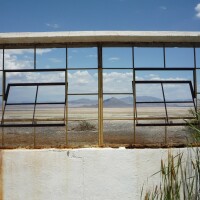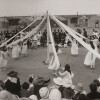Miracles and Mirages: How Curtis Howe Springer Stole the Desert

Union Bank is a proud sponsor of Lost LA. 
When asked, former insurance salesman turned radio evangelist Curtis Howe Springer called himself "the last of the old-time medicine men." He also claimed to be the Dean of Greer College and appended various false academic and professional credentials to his name, usually choosing between Reverend, M.D. and Ph.D. However, Springer never really bothered to attend a university or graduate medical school. The only certification Springer earned came in 1969 when the American Medical Association bestowed upon him the title "King of Quacks."

Springer traveled throughout the Midwest during the 1930s, preaching a Christian gospel and lecturing on health and hygiene. He also hawked an assortment of elixirs and cure-alls without being overly specific about ingredients or effectiveness. His lectures grew in popularity and Springer capitalized on his success. Following in the footsteps of evangelists Aimee Semple McPherson and Father Charles Coughlin, Springer took his gospel and his products on the air twice a day with his very own radio show. (Listen to an audio sample of Springer's radio show found in the article "Zzyzx: Revisiting Doc Springer's Boulevard of Dreams.")
With his confident tone and practiced patter, Springer enticed his radio audiences to purchase his homemade homeopathic preventatives for hair loss and hemorrhoids, asking in exchange only a small donation to his ministry. The market for miracle cures proved as lucrative in the 1930s and 1940s as it does today, and he invested his profits, hoping to expand his enterprise into an empire. He again took his show on the road, this time landing in sunny Southern California.
Springer registered paperwork with the federal government and chose a small strip of land at the edge of the Mojave Desert where, like an Old Testament prophet, he founded Zzyzx. Springer filed a mining claim, although he had no intention of digging for gold. Instead, he planned to have the gold come to him. Springer invented the nonsensical name Zzyzx to be "the last word in health." After years as an itinerant preacher selling dubious cures, often one step ahead of the authorities, Springer envisioned Zzyzx as a profitable medical retreat for those seeking his so-called natural remedies. Just a few hours east of Los Angeles, the location offered convenient access to everything he needed for his new venture.

Springer rounded up a labor force comprised of the destitute from Skid Row, offering them room and board in exchange for their labor. Beginning with nothing more than a row of tents, Springer and his workers quickly built a group of concrete cottages centered around The Castle, a two-story hotel for paying guests. The small community soon included dining and lecture halls, a pool and the obligatory chapel. Springer also installed a diesel-powered boiler to create an imitation hot spring for health-restoring baths. Off the main street, known as the Boulevard of Dreams, Springer built an artificial lake he named Tuendae, ostensibly a Native American word meaning "where the waters come together." Springer invited the faithful to join him in enjoying the health benefits of the desert, mineral springs, and his sundry questionable medicines, all for a reasonable fee.
For nearly three decades Zzyzx, an oasis in the barren desert, remained a popular destination for the health-conscious Christian. Springer promoted the resort on his syndicated radio show which, at the height of its popularity, ran on over 300 stations. Traveling back and forth to Los Angeles, Springer delivered recordings of his latest sermons, purchased advertisements in newspapers, and ordered supplies for his medical concoctions, consisting primarily of celery and carrot juices. He also provided the faithful with transportation, running a free shuttle service to carry guests from the city for their stay in the desert. Springer successfully transformed a seemingly barren patch of desert into a bustling business, selling snake oil and salvation. Yet, in a familiar story, it was his success that led to his downfall.

In 1969, a number of unsatisfied customers made complaints, spurring an inquiry of Springer and his medicines. A condemnation by the American Medical Association led to Springer’s arrest for fraud. Though Springer fought the charges strenuously, he was convicted, fined and sentenced to 60 days in jail. At the same time, the Bureau of Land Management opened an investigation of Springer’s mining claim. In violation of the terms of the claim, he had begun dividing the tract into separate parcels and offering them to his largest donors, in effect selling public land as though he owned it. In 1974, the court found Springer guilty of squatting on public lands and evicted him. He retired to Nevada, his Boulevard of Dreams broken.

The Desert Studies Center now occupies the site of the former health spa. Founded in 1976, the DSC functions as a joint research outpost for seven Los Angeles schools in the CSU system. A model of self-sufficiency, the center exists entirely off the grid by making use of both solar and wind power for electricity, while a well and reverse osmosis system produce water for drinking. Students and scientists from a wide array of disciplines use the center, researching everything from climate change and dune formation to the endangered Mohave tui chub, a type of fish found only in the Mojave River. The DSC also hosted researchers from the Jet Propulsion Laboratory as they tested robotic vehicles intended for use on Mars.
As a center for evidence-based scientific research, Zzyzx today bears little resemblance to the disreputable health palace of yesterday. The publicly held land which Springer once sold resides again in the public trust, providing an important academic resource.
As a health guru, Springer had little of substance to offer. As a relatively successful snake oil salesman, he demonstrates the dangers for those seeking quick fixes and miracle cures. Springer’s medicines and tonics, like his dream of a health spa, proved to be mirages that were only effective in separating the faithful from their funds.
Top Image: A roadside sign pointing the way to Zzyzx | Jason Wallace/CSU Desert Studies Center









